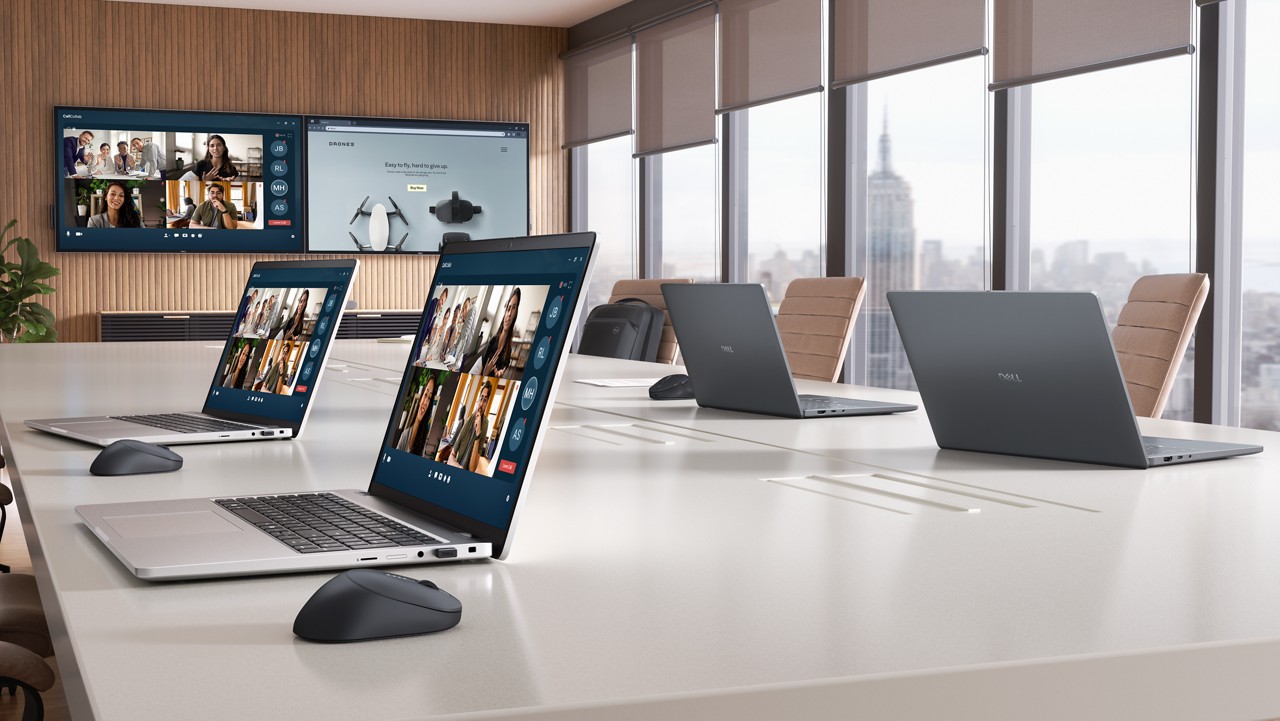
Some people think that laptops are all the same, that the Dell you can buy off-the-shelf has the same specification as the one your IT department can source. While some specs are certainly matched, business laptops and consumer laptops differ in many ways.
BYOD might be a solution for workplace flexibility, but you’ll miss out on security, manageability, services and other benefits of Dell’s business laptops. It’s one of many myths about business laptops that we’re about to break…
Myth 1: Business laptops are just consumer models with a higher price tag
Truth: While they may look similar, business laptops are designed to withstand the rigors of professional use and offer enhanced security, manageability, and services.
It is easy to dismiss the business laptop option on price alone, but this betrays a lack of knowledge about what the product can deliver. For example, Dell Pro laptops undergo rigorous MIL-STD testing for durability and reliability. Dell Pro laptops1 are also built with a modular USB-C port that is more durable and enables easier repairs.
Furthermore, Dell Pro laptops feature built-in security and simplified management tools, freeing up your IT team to focus on driving your business forward.
Research (IDC, 2024) shows that business laptops represent a 37% reduction in life-cycle costs than consumer models (with life-cycle services in place).
While consumer laptops might seem to better suit IT budgets, the annual refresh cycle means that IT teams are caught in a constant rollout of varied machines, which impacts support consistency. Solutions like Dell APEX PC as a Service (PCaaS)² help alleviate this burden by offering a subscription-based model that ensures devices stay up to date while simplifying deployment, support, and asset recovery – all with no upfront investment.
Finally, Dell offers a number of options – whether it’s display, RAM, storage, form factor, and more – to customize your laptop purchases to best meet the needs of your workforce.
TL;DR: The higher price is justified with a purpose-built commercial design and enhanced security, manageability, and services.
Myth 2: Security is the same across all laptops

Truth: Business laptops feature hardware-level security configured for enterprise use.
A typical consumer laptop will have support for biometric authentication (such as that supported by Windows Hello) and security software. But this doesn’t come close to what you can expect on a business laptop.
Dell SafeBIOS, unavailable in most consumer devices, provides deep, BIOS-level visibility into a Dell Pro laptop, helping to catch and repel suspicious activity before a cyberattacker does damage. Physical protections and BIOS-level tamper detections help prevent unauthorized access to highly privileged areas of the PC. This enhances the foundational security of the fleet, preventing the use of unauthorized boot devices and USB ports. Similarly, hardware encryption is provided by BitLocker on Windows 11 Pro and above, a far more powerful tool than Windows 11 Home’s Device Encryption, offering features like pre-boot authentication. Additionally, for stronger defense against rising identity attacks, Dell SafeID is also available on business laptops for enhanced end-user credential protection.
Because security takes a village, Dell offers software security from its partner ecosystem. What’s more, Dell integrates its PCs’ built-in defenses with leading partners (CrowdStrike, Absolute) with unique telemetry, helping to streamline IT and security workflows.
Security Feature | Consumer Laptops | Dell Pro Business Laptops |
TPM 2.0 (Trusted Platform Module) | Often included only on mid/high-end models | Standard across all Dell Pro models for hardware-based encryption |
BIOS Protection | Basic firmware security; limited vendor support | Dell SafeBIOS helps prevent, detect and recover from BIOS tampering |
Hardware-based credential storage | Typically software-only (passwords or Windows Hello) | Dell SafeID with Control Vault protects credentials within a dedicated hardware chip |
Encryption Support | OS-level BitLocker (manual setup) | Preconfigured encryption and remote policy enforcement |
PC telemetry | Limited security alerts and notifications | Telemetry pushes BIOS-level alerts to the OS for swift investigation and response Enables integration with software security |
Multi-Factor Authentication (MFA) | Software-based (Windows Hello, app-based MFA) | MFA with credentials stored securely in hardware. Options available: smart cards, NFC and fingerprint readers. |
Support for Zero Trust Architectures | Generally unsupported | Activated zero trust principles |
TL;DR: Built-in hardware security solutions cover both online and physical threats on Dell Pro business laptops, in contrast to the largely software-focused security on consumer laptops.
Myth 3: You don’t really need AI for work
Truth: The evolution of the workplace demands AI-equipped business notebooks and laptops for optimum productivity.
We’re long past the stage where AI is an elaborate parlor trick. Beyond the excesses of generative AI on social media, the technology as a whole is a key element of the next step of business development. A business running consumer laptops and relying on AI solutions powered by the cloud isn’t ready for the next step; it’s already behind organizations, SMEs, and corporations running AI-equipped Dell Pro laptops.
On-device AI allows for quick, cost-effective, and secure use of artificial intelligence for automation and generative tasks, and thanks to power-optimized CPU, GPU, and NPUs, Dell Pro laptops are well-equipped to efficiently handle these tasks.
TL;DR: Dell laptops let you do more in less time with on-device AI that works seamlessly and efficiently -- without draining your battery.
Myth 4: Business laptops aren’t worth the extra cost
Truth: They typically cost less over time, thanks to minimized disruptions, enhanced life-cycles, and advanced manageability features for IT, enabling superior support.
Using cloud-based solutions like the Dell Management Portal, IT administrators can save and effort, when managing a fleet of business laptops. Dell’s ProSupport Suite for PCs support offers, with three to five years of coverage, help reduce IT interventions. Fewer replacements mean reduced upfront costs, and this enterprise-level support is simply not available for consumer laptops.
Dell’s APEX PC as a Service (PCaaS) approach empowers customers to invent in the latest technology without upfront costs. Recently named a leader in the IDC MarketScape: Worldwide DaaS 2025 Vendor Assessment,³ Dell’s APEX PCaaS enables businesses to plan refresh cycles strategically, making investments in the latest hardware and services, with predictable costs per user.
TL;DR: Longer warranty coverage, remote management, better deployment, and flexible solutions like APEX PCaaS make business laptops a smarter and more cost-effective choice than consumer laptops.
Myth 5: A budget laptop with Windows 11 Home does everything you need for business

Truth: Dell business laptops running Windows 11 Pro are the smart option for intensive productivity and have excellent warranty and support options.
While a budget laptop with a basic OS might be great for online shopping, it isn’t going to cut the mustard in the presentation room. Windows 11 Home is ideal for domestic use, but you need the enhanced features of the Windows 11 Pro operating system to really take advantage of the features of a Dell business laptop with AI.
TL;DR: Budget laptops are more affordable than business notebooks, but while they offer basic productivity, these devices fall short on intensive use, manufacturer support, and on-device AI options.
So, while you can take your laptop to work and benefit from flexible working policies, the productivity, security, manageability, support and services, and commercial-grade design benefits of an AI-equipped Dell business laptop outweigh the advantages that flexibility offers.
If you think Dell laptops are the right fit for your business, find out more on the Dell website. Visit Dell US to learn more. If you're in the UK your local Dell Business site will provide more information. Canadian reader? Visit Dell in Canada. Australian readers should visit Dell Australia.
1Applies to Dell Pro, Dell Pro Plus, and Dell Pro Premium notebooks launching in 2025. Based on internal analysis, November 2024. New USB-C port design is a screwed-on connection for easier repairs and improved durability. Read warranty information for USB-C port replacement instructions. ²Payment solutions provided and serviced by Dell Financial Services L.L.C. or its affiliate or designee (“DFS”) for qualified customers. Offers may not be available or may vary in certain countries. Where available offers may be changed without notice and are subject to product availability, applicable law, credit approval, documentation provided by and acceptable to DFS and may be subject to minimum transaction size. Offers not available for personal, family or household use. Dell Technologies and the Dell Technologies logo are trademarks of Dell Inc. Restrictions and additional requirements may apply to transactions with governmental or public entities. Dell APEX PCaaS: At the end of the contract, the customer may renew the contract or return the equipment to DFS. ³IDC MarketScape: Worldwide DaaS 2025 Vendor Assessment”, September 2025, IDC # US53783925
Sign up for breaking news, reviews, opinion, top tech deals, and more.